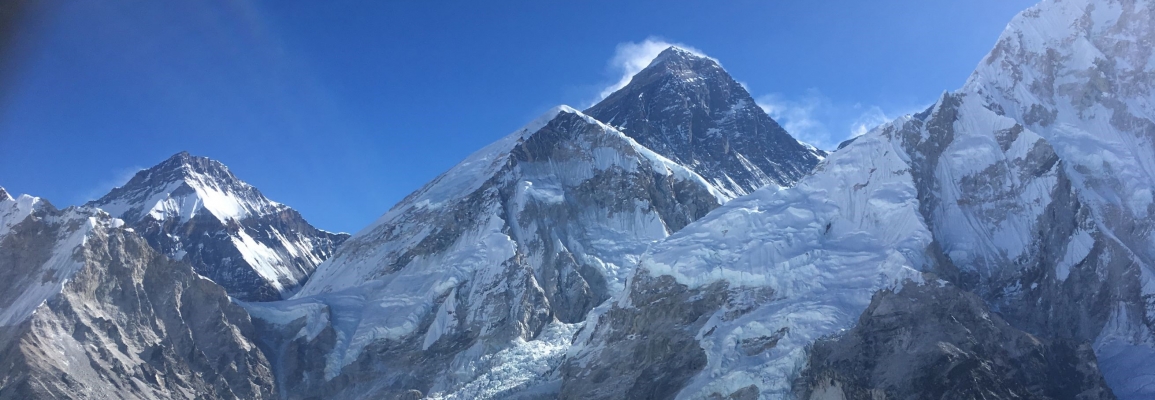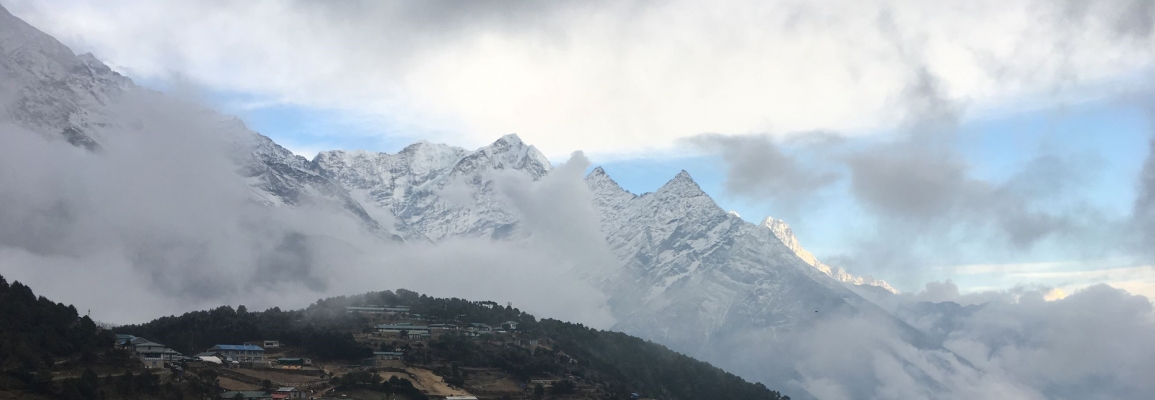Program Dates: May 24 - June 12, 2024
"What happens when the roof of the world melts?" (Tenzing Gyalzen Sherpa, Boone, 28 February 2023)
The Everest (Khumbu) region of the Nepal Himalaya is home to the highest mountains in the world, with extensive snow and glacier ice that serve as water towers that sustain downstream communities. Climate change is transforming the region, resulting in major deglaciation and changing precipitation patterns that threaten water resource availability and magnify natural hazards. The short-term study abroad experience will build on Dr. Baker Perry's team's work on and around Mount Everest, in part under the auspices and with the support of the National Geographic Society, Rolex, and Tribhuvan University. A two-week trek to Kala Pattar and Everest Base Camp through the heart of the Khumbu region will provide an outstanding setting for investigation of the complexity of both the drivers (e.g., geographic scales, interdependencies, governance) and impacts of climate change on glaciers, ecosystems, water resources, and local communities. Students will also be directly involved in annual maintenance visits to the Phortse and Base Camp weather stations installed in 2019.
Photo: Mount Everest and the Khumbu Glacier from Kala Pattar. Credit: Baker Perry/National Geographic.
Photo: Sherpa village Namche Bazaar, Khumbu Region, Nepal. Credit: Baker Perry/National Geographic.
Location: Nepal
The Nepal Himalayas contain eight of the fourteen 8,000-meter peaks in the world, including the highest, Mount Everest, at 8,849 m. Mountain glaciers are found above 5,000 m and provide essential water resources for downstream communities and ecosystems. The program will be based in the Khumbu (Everest) region, home to Sagarmatha National Park and the rich cultural traditions of the Sherpa people.
Here is a National Geographic video about Mount Everest: Everest Weather - Data is in the Clouds | National Geographic
(Source: National Geographic)
Academics
All program participants will be enrolled in the courses below.
If you have taken one or more of the courses below, or need a similar but different course to meet major or minor requirements, you may seek permission to take a substitute or "special course." Approval for such exceptions is at the discretion of the faculty leader(s), department chairs, and the college dean, and require the University's special course form. Please contact the program leader before you begin your application.
Course Prefix | Course Name | Credits | Instructor |
HON 2515 | Climate Change in the Nepal Himalaya | 3 | Dr. Baker Perry |
GHY 2300 | Himalayan Mountain Environments & People | 3 | Dr. Baker Perry |
HON 3515 | Society, Technology and Climate Change | 3 | Dr. Ram Poudel |
TEC 2029 | Society & Technology | 3 | Dr. Ram Poudel |
Faculty Leaders
Dr. Baker Perry
Senior Scholar, Research Institute for Environment, Energy, & Economics
Department of Geography and Planning
Program Director Dr. Perry has spent approximately 5 years in the Andes Mountains, primarily in Bolivia and Peru. He has led or co-led 16 short-term study abroad courses to Peru, Bolivia, and Ecuador while at App State and has led or co-led 21 scientific research expeditions in the region. Perry and other team members installed a network of weather stations — including the two highest in the world — on Mount Everest in 2019 as part of the National Geographic and Rolex Perpetual Planet Expedition.
Dr. Ram Poudel
Assistant Professor
Department of Sustainable Technology & the Built Environment
Dr. Ram Poudel is a faculty in the Department of Sustainable Technology and the Built Environment at Appalachian State. A part of his research explores the nexus of energy, technology, and human society along the line of the Sustainable Development Goals SDG07. Earlier, Dr. Poudel led various Asian Development Bank's (ADB) energy access projects in the Himalaya of Nepal. The ADB rural electrification projects in the northern mountain regions of South Asia focused on empowering local schools, hospitals, and community organizations with off-grid electricity generated utilizing local renewable energy resources. Dr. Poudel teaches courses related to renewable energy technologies (solar PV, wind, hydropower) and energy efficiency.
Program Cost: $6,900
Program cost includes airfare, visa, meals, lodging, and in-country transportation.
Please note - Students are responsible for the total program cost upon submitting the application and deposit. Refunds are contingent upon meeting the minimum enrollment of the program. If a student decides to withdraw before departure, that student may be eligible for a refund if the program has met minimum enrollment and is therefore viable.
Payment Schedule | Amount | Date |
Deposit | $300 | Upon receipt of application |
Remaining balance due | $6,600 | 03/19/2024 |
Estimated Additional Expenses |
|
Undergraduate Tuition - Resident | $153 / credit hour |
Undergraduate Tuition - Non-resident | $173 / credit hour |
Graduate Tuition - Resident | $188 / credit hour |
Graduate Tuition - Non-resident | $208 / credit hour |
Passport | $150 |
International Phone Plan? |
|
Non-billable costs are estimates only and will be affected by personal spending habits, currency fluctuations, etc. Prices listed in USD unless otherwise noted. Students are encouraged to start planning for their study abroad program costs well in advance.
Appalachian reserves the right to cancel or alter the program format or to change costs in case of conditions beyond the university's control. Further details about Appalachian's withdrawal/cancellation policy can be found at this link.
Application Process
*Note: This program's application is by invitation only.
- In order to apply for this program, you will need to contact one of the program leaders and provide your Banner ID and email address. Program leaders may request additional information or a meeting to discuss the details of the program and your interest.
- When permission to apply for the program is granted, you will receive an email from your program leader with instructions to apply.
- Apply to the program following the instructions from the program leader
- Print, sign and drop off your application at the Office of International Education and Development at Plemmons Student Union (PSU), Suite 321 ( 3rd floor), 263 Locust Street Boone, NC 28608. Your application will be considered complete when you have submitted your digital application, paid the $300 deposit, and dropped off your printed and signed application. The fee cannot be paid until it appears on your student account. Please note that it may take 2–3 business days for it to post to your account. You will receive an email with Instructions for paying the deposit fee. Instructions can also be found in the application.

